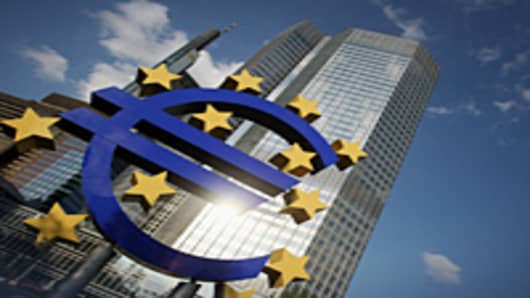Mario Draghi is laying out a master plan to save the euro.
The European Central Bank President’s end game is to very publicly — and very precisely — define single markets on to which the central bank will unleash unlimited firepower in the explicit name of saving the single currency.
Draghi’s plan could fail. But equally today might prove historic.
Ironically the core strength of the plan is precisely what disappointed markets— delay. There was no announcement of immediate purchases of Spanish and Italian sovereign debt. That’s because Draghi is deliberately plotting out a process that he says will entail "a cold minded analysis of the facts" in order to build the maximum possible consensus — precisely to justify deep-pocketed, decisive action.
Equally there was no climb down from Draghi’s promise last week to do everything required to save the euro. At his news conference in Frankfurt, Draghi told journalists that those sentiments had been expressed many times behind the closed doors of the ECB’s Governing Council and that at today’s meeting no one was surprised he’d said it.
Moreover, he said the Council had voted unanimously to include the follow sentence in the statement he read: "Risk premia that are related to fears of the reversibility of the euro are unacceptable, and they need to be addressed in a fundamental manner. The euro is irreversible."
Draghi effectively confirmed that a two-prong assault is being planned for sovereign debt (explain this) markets. The European Financial Stability Facility (explain this)/European Stability Mechanism bailout funds will buy sovereign bonds directly from governments at their primary auctions. The ECB (explain this) will back that up by buying sovereign debt in the secondary, publicly traded markets.
Thursday's big news is that Draghi is effectively telling Italy and Spain that ECB buying can only be triggered after they have formally asked the EFSFfor a bailout (which in turn triggers that fund to buy their debt at auction). But that also implies both having to bite the bullet in accepting an adjustment program from the EU/ECB/IMF and attached conditions.
A couple of hours later at a news conference in Madrid, Spanish Prime Minister Mariano Rajoy and Italian Prime Minister Mario Monti shied away indicating whether they would seek such support, but it’s been widely speculated that Rajoy is already moving towards a bailout.
Spain and Italy’s formal adoption of agreed austerity and structural change would delight the Germans who are focused on process.
No doubt Mario Draghi also delighted Angela Merkel Thursday when he stamped out the idea that the ESM could get a banking license and therefore unlimited access to ECB funds. During his news conference, he revealed that a legal opinion five months ago ruled that out for the Governing Council and he was very surprised by recent media coverage.
Mario Draghi is also seeking a consensus within the ECB for action. Deferring to its various committees to work out over the coming weeks other ‘non-standard’ measures, such as further relaxing collateral rules. And more importantly clarity on the new rules it will lay-out for buying sovereign debt.
The ECB President noted that there had been one "reservation" Thursday on the Governing Council to launching this internal process — presumably the Bundesbank. But winning over politicians in Berlin could give Draghi vital political cover to override German votes on the Council when policy recommendations are returned.
To put is simply, Mario Draghi laying out a process to — very publically — get most of Europe’s ducks in a row. With the explicit threat that when that’s completed there will be massive, defined intervention.
Or as he puts it, "explicit conditionality" and "full transparency" about the countries involved and the size of the threatened bond purchases.
Draghi’s hope will be that the threat of action at the end of a defined process playing out in public will itself halt contagion, support bond prices and go some way to restoring market confidence in the euro zone.
—By CNBC's Simon Hobbs


